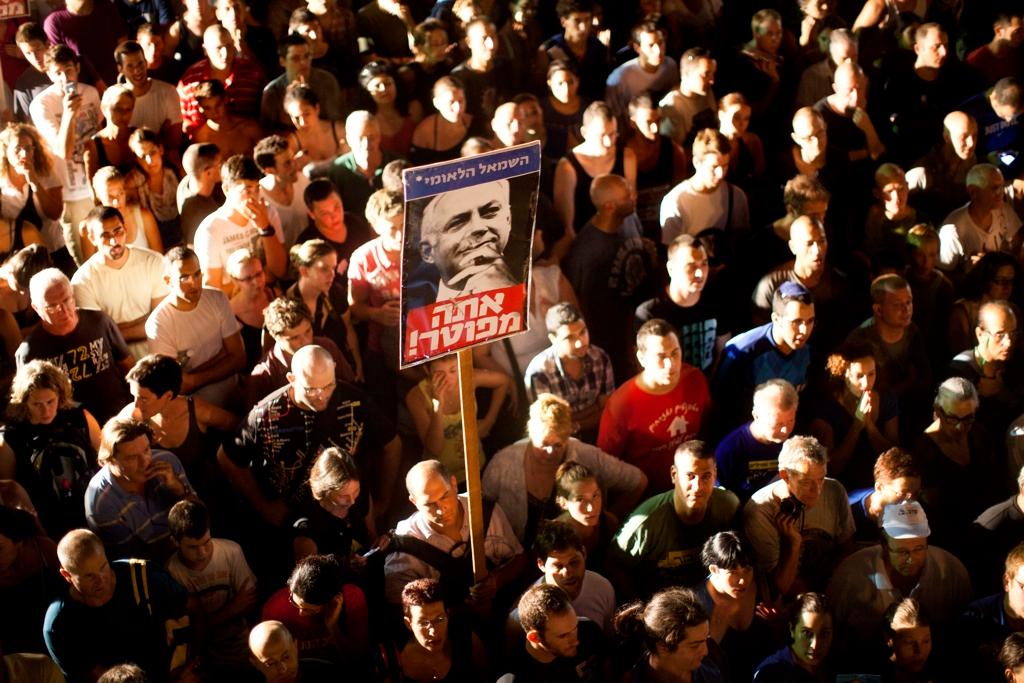Israel’s protests, even in their end, pose challenge to Netanyahu
Demonstrators pack the streets of Tel Aviv, Israel on Sept, 3, 2011 .
JERUSALEM — The social activism that surprised and then engulfed Israel over the last few months appears to be turning into a permanent factor in Israeli politics, presenting a serious, and sustained, challenge to the government of Prime Minister Benjamin Netanyahu.
The government panel set up to respond to the wide array of demands — public housing, tenant rights, more market regulation, legislation aimed at curbing the cartels that dominate many Israeli product markets — delivered its report late last week.
But in what is being widely seen as a capitulation to his political opponents, Netanyahu, who promised the country that the cabinet would approve its recommendations on Monday, failed to assemble the necessary votes, even among his own Likud party.
Among the ministers who refused to toe the government line were members of two right-wing parties who may already be mapping out strategies for opposing the prime minister in the next elections, including Foreign Minister Avigdor Lieberman, who has developed an increasingly surly presence in the cabinet as his poll numbers have improved.
Related: Is this the end of Israel as we know it?
The aborted cabinet decision was nonetheless something of a surprise. The committee's chairman, Tel Aviv University professor Manuel Trajtenberg, has intimated that if his recommendations are not put into place he will adopt a public, and possible political role, lobbying the government. Among other proposals, the committee’s recommendations included opening up Israeli markets to import, lowering customs fees, various regulations to control monopolies and conglomerates and a significant reduction in the gasoline tax.
Several months ago, Trajtenberg’s warning would have been perceived as an insignificant threat for Netanyahu’s generally stable coalition government. But with Shelly Yachimovitch, the newly-minted Labor Party leader in the wings calling for early elections and growing public pressure from Israel’s traditional allies, including the United States and Germany, to embark upon internationally-sponsored peace talks with the Palestinians and the cessation of all settlement building, Netanyahu finds himself, like his nation, increasingly isolated and vulnerable.
A visit on this turbulent Monday by U.S. Defense Secretary Leon Panetta, in which he told reporters accompanying him that “it is not a good situation for Israel to become increasingly isolated,” did nothing to calm nerves in Jerusalem.
In the light of the Trajtenberg recommendations and the government's failure to act on them, the Histadrut Labor Union, one of the country's largest and most powerful, has called for a general strike next week.
On the other hand, the social protesters, who initially took to Facebook about four months ago to rail against the inflated price of cottage cheese (a local staple and a creamier, more flavorful product difficult to compare with its American namesake), were handed an unexpected victory in the resignation of Zehavit Cohen, the CEO of Israel’s dairy giant, Tnuva.
More: Even good news is bad news for Israel
Despite a compelling up-by-her-bootstraps personal story, Cohen, a well-known public figure in the mold of a local Lee Iaccoca, was unable to distance herself from the public perception that she represented the public face of Israel’s capitalism run amok.
Hours after her resignation, Tnuva announced across the board reductions in prices of about 15 percent for almost all its dairy products.
Following their dramatic success against the Tnuva conglomerate, social protest leaders launched a major new and old media campaign, calling for action against other food giants.
Sounding like an experienced economic critic more than an undergraduate, movement leader Itzik Elrov called for an immediate boycott of Osem brand products. Among other complaints, Elrov pointed out that the company's products exported to the American market sell for up to 30 percent less than they do in Israel.
The week also opened with the final forced evacuation of all the remaining protest encampments in Tel Aviv. At daybreak Monday morning, Tel Aviv municipal workers began closing off streets and clearing out what remained of hundreds of tents that crept across the city this summer, as young adults and students demanded a major change in the nation’s housing policies.
Related: Israel and Palestine give up on America
Previous attempts to clear out the tent cities had met with resistance and Supreme Court petitions. But this time, a movement weakened by the departure of many students who returned to their dorms last month exhausted after an extraordinary summer of demonstrations, seemed to have little if any response.
Tent cities still dot almost all other cities in Israel, including most of Jerusalem’s public parks, but the demise of Tel Aviv’s protest camps, where the movement gained its greatest momentum, is seen as the symbolic end of at least the initial phase of the protests.
Speaking with reporters Monday night after the cabinet’s failure to endorse the Trajtenberg Committee’s report, Finance Minister Yuval Steinitz repeatedly emphasized that the panel’s recommendations embody the government’s own positions on “social justice.”
Sounding like a man eager to claim the commission’s conclusions as his own, Steinitz said that “postponing the vote was not akin to a rejection,” and vowed that few, if any, “adjustments or corrections” would be made.
Daphni Leef, the 25-year-old who first organized the tent encampments when she was unable to afford new digs in Tel Aviv, was one of the few people to express approval of the cabinet's disapproval.
“We’ve waited a long time and we deserve more than having these recommendations snuck by us,” she said.
We want to hear your feedback so we can keep improving our website, theworld.org. Please fill out this quick survey and let us know your thoughts (your answers will be anonymous). Thanks for your time!
